Search
Remove Ads
Advertisement
Summary 
Loading AI-generated summary based on World History Encyclopedia articles ...
Search Results
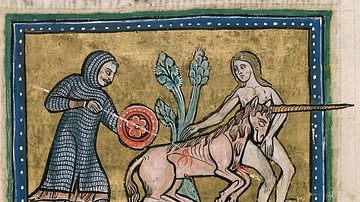
Article
The Unicorn Myth
The unicorn, a mythical creature popularized in European folklore, has captivated the human imagination for over 2,000 years. For most of that time, well into the Middle Ages, people also believed them to be real. The roots of the unicorn...
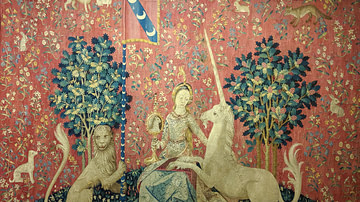
Image Gallery
The Lady and the Unicorn: Medieval Tapestries
The Lady and the Unicorn tapestries, housed at the Musée de Cluny in Paris, are a series of six exquisite medieval tapestries that are renowned for their beauty, craftsmanship, and mysterious symbolism. These tapestries are believed to have...
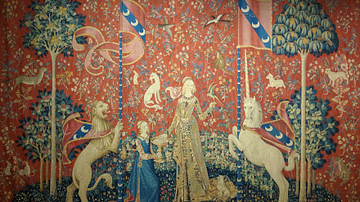
Image
The Lady and the Unicorn: Taste
The Lady and the Unicorn are six tapestries depicting a medieval lady in various poses. Each scene depicts one of the five senses; the sixth scene is labelled À Mon Seul Désir ("to my only desire") whose meaning is unclear. Historians attribute...
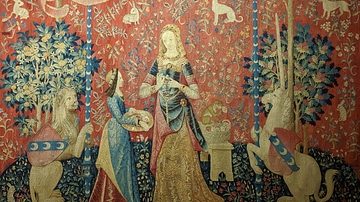
Image
The Lady and the Unicorn: Smell
The Lady and the Unicorn are six tapestries depicting a medieval lady in various poses. Each scene depicts one of the five senses; the sixth scene is labelled À Mon Seul Désir ("to my only desire") whose meaning is unclear. Historians attribute...
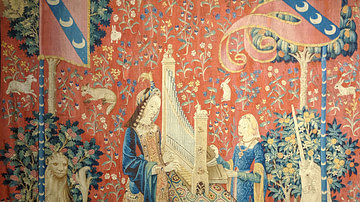
Image
The Lady and the Unicorn: Hearing
The Lady and the Unicorn are six tapestries depicting a medieval lady in various poses. Each scene depicts one of the five senses; the sixth scene is labelled À Mon Seul Désir ("to my only desire") whose meaning is unclear. Historians attribute...
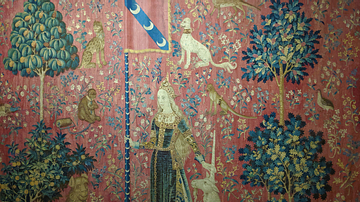
Image
The Lady and the Unicorn: Touch
The Lady and the Unicorn are six tapestries depicting a medieval lady in various poses. Each scene depicts one of the five senses; the sixth scene is labelled À Mon Seul Désir ("to my only desire") whose meaning is unclear. Historians attribute...

Image
The Lady and the Unicorn: Sight
The Lady and the Unicorn are six tapestries depicting a medieval lady in various poses. Each scene depicts one of the five senses; the sixth scene is labelled À Mon Seul Désir ("to my only desire") whose meaning is unclear. Historians attribute...
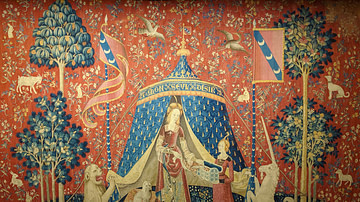
Image
The Lady and the Unicorn: À Mon Seul Désir
The Lady and the Unicorn are six tapestries depicting a medieval lady in various poses. Each scene depicts one of the five senses; the sixth scene is labelled À Mon Seul Désir ("to my only desire") whose meaning is unclear. Historians attribute...
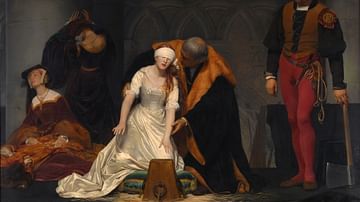
Definition
Lady Jane Grey
Lady Jane Grey (1537-1554 CE) was briefly declared Queen of England for nine days in July 1553 CE following the death of her cousin Edward VI of England (r. 1547-1553 CE). Then only 16 and never officially crowned, Lady Jane was first an...
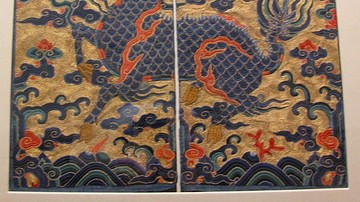
Definition
Qilin (Chinese Unicorn)
The qilin (麒麟, or simply lin 麟) is a Chinese mythical creature, frequently translated as "Chinese unicorn." While this term may suggest a one-horned creature, the qilin is often depicted with two horns. However, like the Western unicorn...